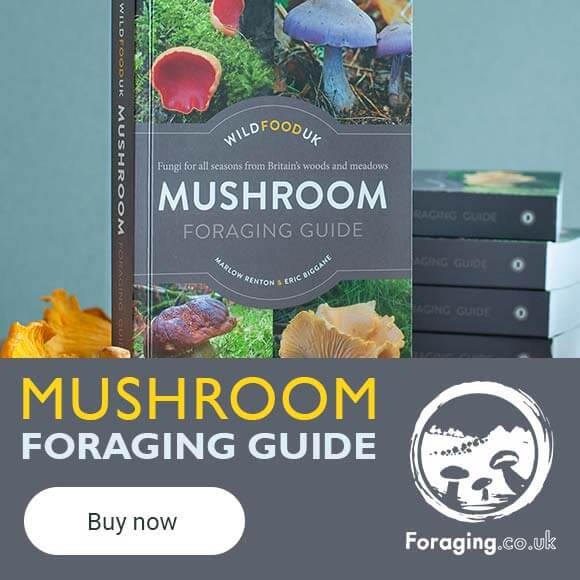Trooping Funnel
Best fried when young and used in soups and stews when more mature. One fairy ring in France measured half a mile across and is estimated to be 800 years old.
| Mushroom Type | |
| Common Names | Trooping Funnel (EN), Monk's Head (US), Twmffat / Twndish Cylchol (CY), Lejkówka Okazała (PL), Óriás Tölcsérgomba (HU) |
| Scientific Name | Clitocybe / Infundibulicybe geotropa |
| Synonyms | Omphalia geotropa, Clitocybe geotropa, Clitocybe gilva var. geotropa |
| Season Start | Sep |
| Season End | Dec |
| Average Mushroom height (CM) | 16-20 |
| Average Cap width (CM) | 10-15 |
Cap
10-15 cm. Convex with in-turned edge and obvious umbo becoming flattened then funnel-shaped but keeping an in-turned edge. Buff/yellow to having a salmon pink tinge.
Gills
Gills pale buff/yellow sometimes with a salmon pink tinge. Running down the stem (decurrent). Crowded.
Stem
16-20 cm long, 2-3 cm diameter. Swollen and a bit woolly at the base. Pale buff/yellow sometimes with a tinge of salmon pink. The stem is very tough and fibrous and usually requires a knife to harvest them. When cooking the stem cut it into discs.
Habitat
Mixed woodland, especially clearings and roadsides. Mainly grows in troops or rings but can be found individually.
Possible Confusion
Potentially deadly Clitocybe rivulosa and Clitocybe dealbatta, pictured, although these mushrooms do not get any where near as big as the Trouping Funnel, so when identifying these mushrooms size matters!
Livid pinkgill (Entoloma sinuatum) is a bit similar but has notched gills and a mealy smell.
Melanoleuca grammopodia again similar but with a pale brown cap and musty smell. If you stick to large specimens, with some being 20cm or more, it would be difficult to confuse this mushroom with any other.
Spore Print
White. Subglobose. You should scrape your spores into a small pile to get an accurate spore colour.
Taste / Smell
Mushroomy. Best eaten young although the larger fungi have a really strong taste and are great used in soups and stews. Should be cooked before consumption.
Frequency
Fairly common.



 (96 votes, average: 3.76 out of 5)
(96 votes, average: 3.76 out of 5)




























24 comments for Trooping Funnel
Thank you! For the photos and video. This all just confirms that, finally, I’ve found my luck in a mixed forest just outside Reigate, Surrey, on a mid-October weekend.
Found some of these Growing in Abbots Wood in East Sussex. Early October
Very helpful identifying these using this site.
We found these on a wild foods walk in Bradley Stoke nature reserve last week and I’ve just been back to collect some. Flesh on mine not pure white though but otherwise matches everything else. All around 20cm across and nearly that tall…
Thank you so much ! What a fantastic resource. I now realise that I have a wonderful “troop” in the small wood at the bottom of my garden in Herefordshire. I was too scared to use them this year because the book I had placed them next door to a number of poisonous species. My troop and are large ! the caps would cover my face – perhaps 10 m long as a unit and 40-50 mushrooms the last time I counted. I have soup for many many years to come.
Nice to see beautiful pics
I think I found a few and noticed small white (milky) globules on the underside most likely from wounds to the mushroom, because when I slice through the flesh of the cap it instantly started to bleed milk. Did I find a trooping funnel?
If it had milky droplets then it is a Milkcap, probably the Fleecy Milkcap which is considered inedible due to it’s toughness and chilli like heat.
As long as they are in good condition, Trooping Funnels last a few days in the fridge.
I found some Common Funnels on the Common here in Cotswolds, growing in a 8′ ring – lovely, but not mentioned in this guide.. I put them i the fridge, and was surprised at the strong almond/bitter almond smell they filled it with!
Visited a large country estate just outside our village a few days ago and first came across some very small examples and then as I continued found some more groups. The odd thing is this is all I saw in terms of fungi, including some lovely large examples. I would like to add a picture but you don’t appear to have that facility.
I found one giant puffball but it had slight yellow color so l left it if l go back to the same place next year will l see any more around the same time l found this one
You should find them each year in the same place but weather has a lot to with the chance of them appearing.
I found some of these trooping funnels yesterday, but they were very yellow. Do you think they were in fact trooping funnels? Or perhaps something more dangerous?
Trooping Funnels turn off white to yellow as they age, at this stage they are probably too old for consumption.
Well I’ve been gathering mushrooms for years, but I’d not ever seen these before – big white funnel shaped mushrooms.
I smelt them, seemed to be okay so picked five good sized specimens and took them home to identify.
They seemed to be giant funnels. I cooked and tasted a thin slice. Incredible.
So ate the lot. Still alive.
What a discovery!
I have been eating trooping funnels for the last 2 years. I recently picked and ate some (quite young), from exactly the same spot I have picked from for the past 2 years. They were without doubt trooping funnels, but I was violently sick around 2 / 3 hours after ingesting. A week or so before I had picked some shaggy parasols, which I am aware can cause gastro upsets, but I have eaten them on many occasions, and 3/4 hours later I was sick.
Is this the end of my foraging for fungi? 🙁
Has anyone else had a similar experience?
I haven’t heard of anybody having a reaction to Trooping Funnels but maybe your body is scared of mushrooms after the Shaggy Parasol reaction. Hopefully this won’t last. I used to eat Shaggy Parasols with no reaction until one time when I got quite sick for a couple of days. There are few ‘Shaggy Parasols’, not just one species so I think one of them is suspect.
My partner suddenly became sensitive to mushrooms so it does happen
Noticed troop of what I believe to be Trooping Funnels on grassy patch under an Oak at end of my street. I live in north east County Durham, is this too far north for this fungi. Reluctant to try a taste but match the video info. Never seen these before.
Trooping Funnels will grow as far north as Durham. As long as they match all the ID features, size, long stem, umbo in the middle of the cap and growing in troops, they should be Trooping Funnels.
They go further north than that. Found them in plessey woods up by cramlington
I found a few mushrooms like these (large specimens) in deciduous woodland today in Northumberland but they had a strong aniseed smell to them. Are they the white version of clitocybe odora?
We would need to see photos of the stem, cap, gills and where they were growing to be able to ID mushrooms.
Found them in Ljubljana walking my dog at a local park (mid-november); harvested more yesterday in the same area 10 meters away! They’re delicious pan fried in butter.